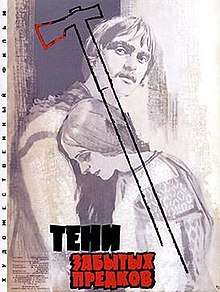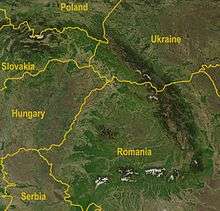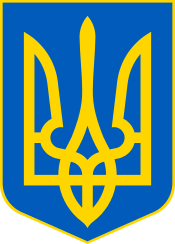Shadows of Forgotten Ancestors
Shadows of Forgotten Ancestors (Ukrainian: Тіні забутих предків, Tini zabutykh predkiv), also called Shadows of Our Forgotten Ancestors, Shadows of Our Ancestors, or Wild Horses of Fire, is a 1965[1] film by the Soviet filmmaker Sergei Parajanov based on the classic book by Ukrainian writer Mykhailo Kotsiubynsky. The film was Parajanov's first major work and earned him international acclaim for its rich use of costume and color. The film also features a detailed portrayal of Ukrainian Hutsul culture, showing not only the harsh Carpathian environment and brutal family rivalries, but also the various aspects of Hutsul traditions, music, costumes, and dialect.
| Shadows of Forgotten Ancestors | |
|---|---|
 Russian poster | |
| Directed by | Sergei Parajanov |
| Screenplay by | Ivan Chendej Sergei Parajanov |
| Based on | Shadows of Forgotten Ancestors by Mykhailo Kotsiubynsky |
| Starring | Ivan Mykolaichuk Larisa Kadochnikova Tatyana Bestayeva |
| Music by | Myroslav Skoryk |
| Cinematography | Viktor Bestayev Yuri Ilyenko |
| Distributed by | Artkino Pictures (U.S.) Films sans Frontières (France) |
Release date |
|
Running time | 97 minutes |
| Country | Soviet Union |
| Language | Ukrainian |
Plot
In a small Hutsul village in the Carpathian mountains of Ukraine, a young man, Ivan, falls in love with the daughter of the man who killed his father. Though their families share a bitter enmity, Ivan and Marichka have known each other since childhood. In preparation for their marriage, Ivan leaves the village to work and earn money for a household. While he is gone, Marichka accidentally slips into a river and drowns while trying to rescue a lost lamb.
Ivan returns and falls into despair after seeing Marichka's body. He continues to work, enduring a period of joyless toil, until he meets another woman, Palahna, while shoeing a horse. Ivan and Palahna get married in a traditional Hutsul wedding in which they are blindfolded and yoked together. The marriage quickly turns sour, however, as Ivan remains obsessed with the memory of Marichka. Estranged from her emotionally distant husband, Palahna becomes involved with a local sorcerer, while Ivan begins to experience hallucinations.
At a tavern, Ivan witnesses the sorcerer embrace Palahna and strike one of his friends. Roused into an uncharacteristic fury, Ivan snatches up his axe, only to be struck down by the sorcerer. Ivan stumbles into the nearby woods and perceives Marichka's spirit to be with him, reflected in the water and gliding amongst the trees. As reality merges into dream, the colorless shade of Marichka reaches out across a great space and touches Ivan's outstretched hand. Ivan screams and dies. The community gives him a traditional Hutsul burial while children watch through cross braced windows.
Themes
The film is highly symbolic, making frequent use of religious and folkloric images that include crosses, lambs, graves, and spirits. The film also uses color to represent mood. During Ivan's period of mourning, black and white film stock is used. In other scenes, colors are often muted, but provide a contrast to vivid use of red and yellow. On its release, the film's presentation contrasted with the common socialist realism style that had government approval. After refusing to change the film, Parajanov was soon blacklisted from Soviet cinema.[2]
Cast
- Ivan Mykolaichuk - Ivan
- Larisa Kadochnikova - Marichka
- Tatyana Bestayeva - Palagna
- Spartak Bagashvili - Yurko
- Nikolai Grinko - Batag
- Leonid Yengibarov - Miko
- Nina Alisova - Paliychuk
Release
The film began an international film festival tour in Spring 1965.[3] Political protest followed the premiere of Shadows of Forgotten Ancestors in Kiev on 4 September 1965.[1]
The film was seen by 8.5 million viewers in the USSR.[4]
Filming

Parts of the film were shot in the Dovzhenko Film Studios.
Awards
Grand Prix at Mar del Plata International Film Festival (1965). According to the Film Encyclopedia by Ephraim Katz, "Shadows of Forgotten Ancestors" received the British Academy Award (BAFTA) for "the best foreign production" but per the official statement from BAFTA, obtained by Sergei Parajanov's disciple Martiros Vartanov, the film hadn't won or been nominated.[5]
In popular culture
The band A Hawk and a Hacksaw arranged their sixth studio album You Have Already Gone to the Other World as a new and original soundtrack to the movie. They played their soundtrack alongside the movie in cinemas and theatres in 2012.
See also
- Verbovaya Doschechka
References
- Steffen, James (2013). The Cinema of Sergei Parajanov. Madison: University of Wisconsin Press. p. "xvi. ISBN 978-0-299-29653-7.
- Sergei Paradzhanov
- Steffen, James (2013). The Cinema of Sergei Parajanov. p. 73. ISBN 9780299296537.
- Parajanov.com News
